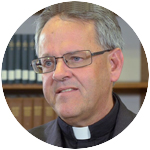
Father Thomas Dailey, O.S.F.S.
The late Richard John Neuhaus once described the Liturgy of the Word on Sundays as “the preliminary to be endured on the way to the Liturgy of the Eucharist.” Put differently, all those words, especially the homily, are what people in the pews have to put up with before they can get what they came for.
Neuhaus wasn’t bemoaning the sad state of Catholic preaching, as much as he was pointing to the low expectations of Catholic congregants, who typically “go to church to be encountered by the Real Presence of Christ in the Mass, not to hear a sermon.”
It’s certainly true that there’s a long build-up at Mass before receiving Holy Communion. It’s likewise true that preachers may try to say too much! Some people even show their frustration at this verbal overload by heading straight out the door as soon as they’ve gotten what they came for.
Nowadays, talk about Holy Communion seems focused more on what happens outside the church doors. A debate has arisen about eucharistic “coherence,” in reference to the relationship between believing what the church believes and acting in a way contrary to that belief. For those whose professed faith and public life do not align, the act of receiving Holy Communion would appear to lack coherence.
[hotblock]
But coherence happens first in the mind, where it remains a concern for all believers. The current Gospel readings from the Bread of Life discourse in the Gospel of John suggest this starting point.
What is it that we come to “get” at Mass on Sundays? A host? A blessed sacrament? A bit of grace?
Even if the response is “all of the above,” the answer is flawed. Seeking to get something is a short-sighted motivation for what happens on Sundays.
Jesus indicates this in his comments to the crowd that followed him across the sea. They saw him miraculously feed 5,000 people with just five loaves of bread; the villagers got more than enough to eat, with leftovers filling 12 wicker baskets. When those people then follow him in search of getting more, Jesus stops them in their tracks:
“Amen, amen, I say to you, you are looking for me not because you saw signs but because you ate the loaves and were filled. Do not work for food that perishes but for the food that endures for eternal life, which the Son of Man will give you” (John 6:26-27).
The problem to which Jesus points is the futility we face in human life. We may eat and be filled, but we always get hungry again! The emptiness of not just our stomachs never completely goes away.
Characteristic of human existence as such, St. Paul describes it as “the futility of (our) minds” (Eph. 4:17). For despite our good desires and our best efforts to fulfill them, we know that everything in this life will, at some point, go away. Money earned is spent. Summer vacations end. Even those we love will, one day, depart from us.
[hotblock2]
Only food that lasts forever can ultimately be satisfying. And when the crowds mistakenly ask for some of “that” bread, Jesus disavows them of their futile thinking. Emphatically he says, “I am the bread of life. Whoever comes to me will never hunger, and whoever believes in me will never thirst” (John 6:35).
It’s not a “what” that fulfills our human longings, only a “who.” Jesus offers himself as the one who, alone, can overcome the futility of life. He opens to us the horizon of eternity, in which everything in this life – from hunger and thirst to success and failure, pleasure and pain, happiness and sadness – everything is put into a new perspective.
On Sundays, when we hear Jesus say “this (bread) is my body,” that is what we get – a taste of eternal life, in the real presence of the God whose life that is. When the truth of this central tenet of our faith becomes coherent in our minds, first, then it has the power to transform how we live.
To facilitate that coherence, all those preliminary words matter more than we tend to think. Some words we say or sing; others are proclaimed for us to listen to attentively, including the homily!
All of them are not simply to be endured; they have for their purpose identifying him, understanding him, and appreciating him whom we have come to encounter, in a sacred event that, when we truly believe it, can change our lives forever.
***
Father Thomas Dailey, O.S.F.S., is the John Cardinal Foley Chair of Homiletics and Social Communications at St. Charles Borromeo Seminary, Wynnewood.
PREVIOUS: Farewell to a good priest and friend
NEXT: No time for fairy tales: Believe the science, get the vaccine


Share this story